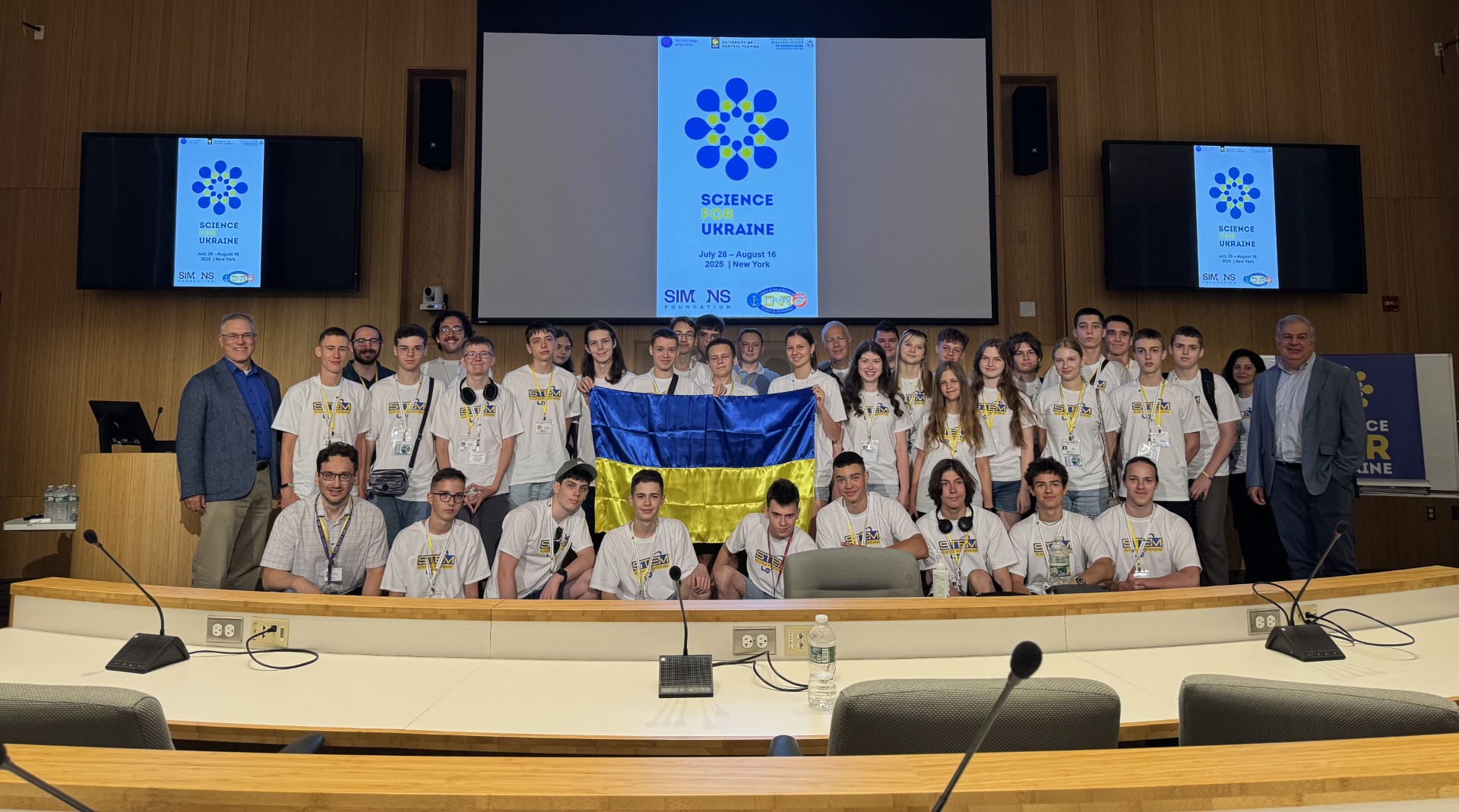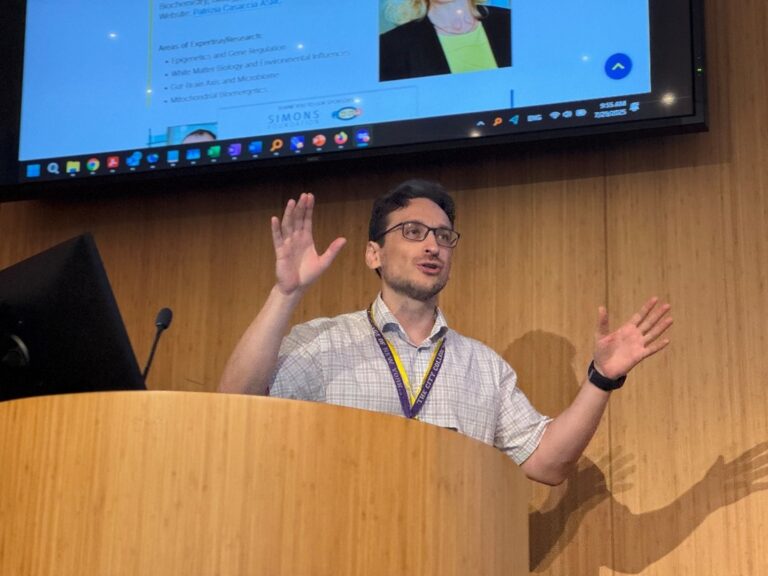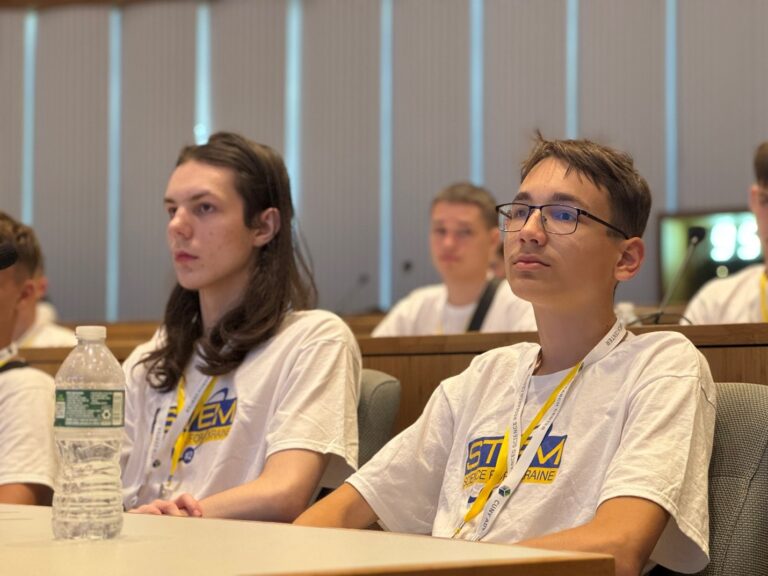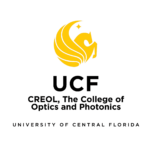Ukrainian STEM Students Find Refuge and Research Opportunities in U.S. Program Led by CREOL Professor

In 2023, bright students at the STEM-focused Ukraine Physics and Mathematics Lyceum in Kyiv were excited to start their next term…as soon as they finished constructing a bomb shelter.
The specialized boarding school trains junior high and high school-level students to become the next generation of scientists and engineers. But with all in-person instruction suspended for the time being, the scientific community started brainstorming how they might reunite the kids in the classrooms and labs.
“There was this idea that, maybe we should bring these kids, at least for some period of time, away from the war, so they stay motivated and keep working,” CREOL Professor Alex Khanikaev says.
At the time, Khanikaev was a professor at The City College of New York (CCNY)’s Grove School of Engineering. He and his colleagues hatched a plan to bring the students there for a summer camp-type of experience. But getting them there wasn’t easy: with consular services shuttered in Kyiv, the students first had to travel to Warsaw, Poland to obtain visas, before continuing on to New York City.
Two years later, Khanikaev – now at CREOL – brought his research team to CCNY to host 30 more students for the second “Science for Ukraine” program in summer 2025.
“In addition to managing the program, we booked dormitories, arranged meals, accommodations, airplanes, health insurance, all these things,” Khanikaev says, “We were sympathetic to these kids as our most junior colleagues dealing with the nearly unbearable circumstances in their everyday lives.”

The program – funded by the Simons Foundation and the Office of Naval Research – is not just a logistically challenging humanitarian endeavor: it’s designed to be an immersive, intensive experience for top-performing students, many of whom are winners or finalists in international science Olympiads. The kids work directly with researchers, including Khanikaev’s team from CREOL. The group conducts experiments in wave phenomena, polarization, interferometry, and two-dimensional materials like graphene. At the end of the program, students present research posters to showcase what they learned.
Khanikaev says the program also greatly enriches the academic experience for his own CREOL graduate students, including Daria Kafeeva, Filipp Komissarenko, Egor Kurganov, Rudin Kraja, Foster Sabatino, Alan Santhosh, and Dmitry Yasnov.
“This is experience I would dream I had as a student, because it would’ve made my life in academia so much easier,” he says.
Each member of his team supervises two Ukrainian students, helping them navigate scientific obstacles in the lab. Khanikaev says that hands-on collaboration goes beyond the usual graduate experience of grading papers and serving as a teaching assistant. It forges close, personal relationships, and creates a paradigm shift from researcher to adviser.
“It’s important for my students to get experience in this kind of program,” he says. “If you want to be successful in science, you need to learn how to organize conferences, how to supervise students at all levels, and how to design educational labs.”

The program also introduces the students to the U.S. higher education system—something Khanikaev hopes will inspire longer-term opportunities. The Science for Ukraine team even held special sessions to explain the process of applying to American universities—including how to write application essays and prepare for interviews.
“Some of the students who participated [two years ago] are now students here in the U.S.” he says, “And even if they decide to stay in Ukraine, it’s great for rebuilding the country after the war ends.”
Students also got a break from the lab, hanging up their lab coats to go on field trips. They toured the Nokia Bell Labs facility and the American Museum of Natural History. Eventually, Khanikaev hopes they can take the kids on an excursion to Disney World – made possible by plans for CREOL to host the next round of Science for Ukraine.
Ultimately, Khanikaev sees the program as both a service and a seed.
“This is a way to give kids hope for the future,” he says.
About Alex Khanikaev
Khanikaev received his PhD degree in Physics from the M. V. Lomonosov Moscow State University in 2003. After graduation, he Khanikaev spent five years at Toyohashi University of Technology, Japan, followed by a stint as a research associate at the University of Texas at Austin, where he contributed to the fields of infrared photonics and plasmonic and all-dielectric metamaterials, biosensing, and graphene photonics. In 2012, Khanikaev introduced the concept of photonic topological insulators. In 2015 he pioneered the field of topological acoustics. In 2013, Khanikaev joined the City University of New York as a faculty member. Since 2024, Khanikaev has been an Endowed Professor, Cobb Family Eminent Scholar Chair, at CREOL. He is a Fellow of Optica, Senior Member of SPIE, a recipient of the NSF Special Creativity Award (2021), and Clarivate Highly Cited Researcher (2022-2024). Khanikaev’s current research focus is on theory, design, and experimental studies of photonic nanostructures, quantum and low-dimensional materials for photonics applications.
